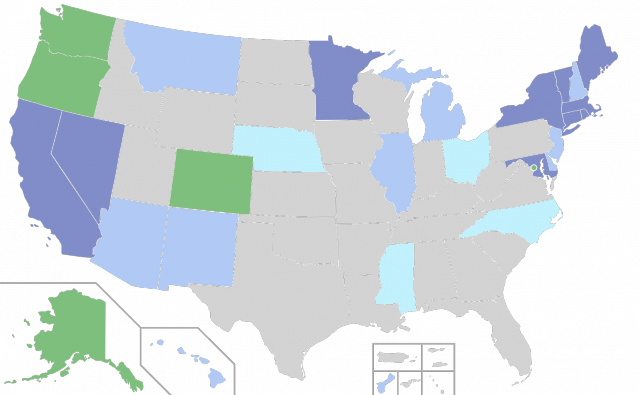Race and Ethnicity
Surprising Lessons From Marijuana Legalization Votes
AK, OR, & DC voted to legalize marijuana. What have we learned? What’s next?
Posted November 11, 2014

Map of the US showing US cannabis laws
Green = State with legalized cannabis.
Dark blue = State with both medical and decriminalization laws.
Middle blue = State with legal medical cannabis.
Light blue = State with decriminalized cannabis possession laws.
Grey = State with total cannabis prohibition
(Nevada has laws decriminalizing cannabis possession for adults age 21 and over; non-medicinal cannabis possession remains a felony with a minimum one-year and a maximum four-year prison sentence for adults under age 21. Thus, Nevada is not considered to have fully decriminalized marijuana.)
Following in the wake of the 2012 marijuana legalization votes in Colorado and Washington, the victories in Alaska, Oregon, and the District of Columbia make it appear that a wave of social change is underway. Even the failure of the medical marijuana vote in Florida (58% in favor fell short of the 60% needed to amend the State Constitution) showed strong majority support for a change in marijuana policy.
Many states have a variety of laws--varying from criminal penalties to decriminalization to medical marijuana to legalization for adults of small amounts of recreational marijuana. These laws are shown in the map above. Thus, the states are already acting as policy laboratories, as envisioned in the constitution.
While it will take years to accumulate sufficient data for clear conclusions, we already know enough to see that the actual issues encountered have been different from those anticipated. Real data (as opposed to ideological arguments and scare tactics) can at last begin to inform marijuana policy.
What were the problems that we were told to anticipate or fear? A rise in crime, car accidents, use of other illegal substances, and teenage marijuana use. While we await data revealing long-term trends on these and other measures, no alarms have thus far been raised
What are the actual issues that have emerged, now that Colorado and Washington have some experience with legalization? So far, there are two--neither of which was anticipated.
The first has to do with food products, including cannabis-containing cookies and brownies. When marijuana is smoked, the vapors go into the lungs and from there directly into the bloodstream, so that the consequences are felt within minutes. As a result, smokers can stop once they achieve the desired psychoactive effect. When marijuana is eaten, the food has to travel through the digestive system before it gets into the blood, so that the effect can take hours before it even begins to be felt. Thus, naïve experimenters may eat a brownie, wait a half hour, feel no effect, and eat another one...or two...or three. Then, a few hours later, they may have a “bad trip” as they discover to their grief that they have overdosed.
As a result of these experiences, a variety of regulatory measures are already in the works, including clearer labeling and visual cues indicating the size of a single dose--e.g., ridges indicating where a cookie or brownie can be broken into single doses.
The second issue is a diminution of tax revenues from recreational marijuana resulting from competition with medical marijuana, which is less expensive. Here too, experience with actual market conditions can lead to regulatory changes (e.g., in tax policy).
As additional states legalize marijuana, it is important that all states--including those that maintain criminal penalties--keep good records. That way, over time, we will be able to compare results among the various policies, and make wiser future choices.
Image source:
Wikimedia Commons: Map of the US showing US cannabis laws.
http://commons.wikimedia.org/wiki/File:Map-of-US-state-cannabis-laws.svg
Information and colors from Map-of-US-state-cannabis-laws.png by CL8 who credited www.norml.org in 11/06 as the source.
Check out my most recent book, The Myth of Race, which debunks common misconceptions, as well as my other books at http://amazon.com/Jefferson-M.-Fish/e/B001H6NFUI
The Myth of Race is available on Amazon http://amzn.to/10ykaRU and Barnes & Noble http://bit.ly/XPbB6E
Friend/Like me on Facebook: http://www.facebook.com/JeffersonFishAuthor
Follow me on Twitter: www.twitter.com/@jeffersonfish
Visit my website: www.jeffersonfish.com


